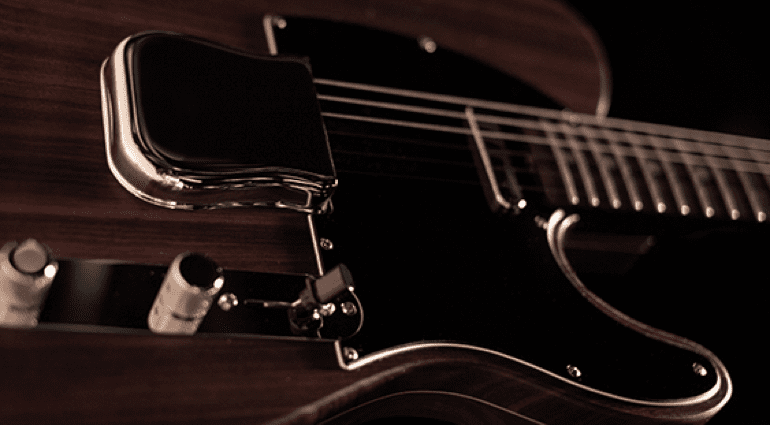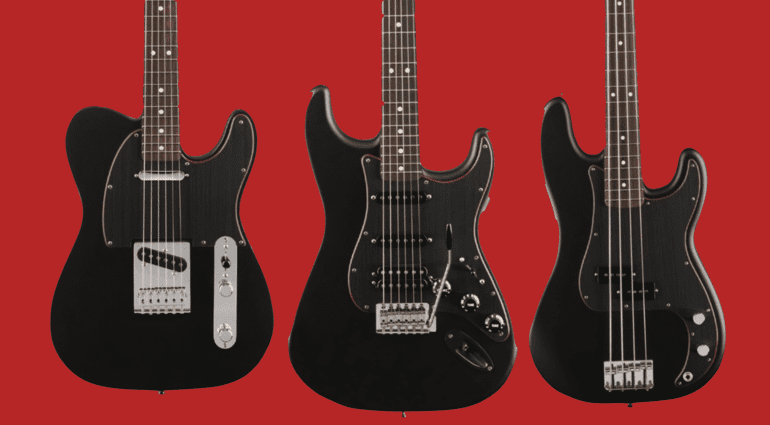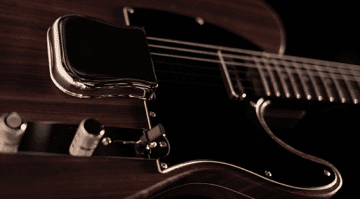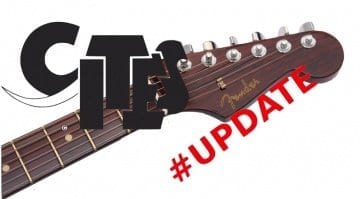CITES 2017: The Rosewood Rules and What They Mean For You (And Your Guitar)
Rosewood and Bubinga in guitars? Could be a thing of the past
On the 2nd of January 2017, the new CITES laws came into force. The rules have changed the game for us guitar players, as every movement of rosewood and some bubinga now has to be accompanied by loads of paperwork. Will it be harder for you to get your hands on guitars using these woods in the future? And what if you want to sell a guitar that has rosewood components? Can you even carry your instrument to a gig abroad? Here’s a CITES 2017 primer.
It Began In Brazil
By now most of us will know that CITES rules on Brazilian rosewood have been in place for a good few years now. (You knew, of course, that CITES stands for Convention of International Trade of Endangered Species of Flora and Fauna.) The rules say that if you want to move anything made of the woods stated in the regulations, you need export papers to do so, along with accompanying certification about where that timber came from and when it was harvested. That even applies to vintage guitars made before CITES covered these woods!
Many companies decided not not use it any more for fear that their products would be either confiscated or destroyed. So why all the hassle? Brazilian rosewood was being so extensively used that it was becoming endangered, and substantial harm was being done to woodland ecosystems by over-felling.
2017: The Rosewood Ban Widens
The new rules cam into force on 2nd January this year. They will make it even harder for you to get your hands on a Fender George Harrison Rosewood Telecaster like this one or perhaps even a cool Suhr offset like this. Essentially, all rosewood, regardless of where it comes from, is now regulated. That means that you need a permit to move it around internationally, which you have to apply and pay for.
The rationale behind the new rules is essentially the same, namely that tree species worldwide are becoming threatened by their over-use in musical instruments. Many are considered endangered. The EU Commission asserts that the problem is “illegal and unsustainable logging”.
This law will hopefully stop ‘black market’ trade in these rarer woods by making it harder for manufacturers to ‘accidentally’ buy them. See the link here for just one example of how much wood is being transported in such a manner.
A few years ago, a story did the rounds that was alarming (or amusing, depending on your point of view). Allegedly Gibson were threatened with confiscation of their wood stockpile because the accompanying paperwork wasn’t quite right. In that case, it was no fault of Gibson, the story goes, but they very nearly lost the lot because of an administrative slip-up.
What does CITES mean for you and your guitar?
If your vintage Gibson Les Paul uses rosewood and you want to sell it internationally it will need to be accompanied by a CITES certificate and marked pre-convention, stating that it was made before CITES came into effect. The paperwork will also vary depending on where you are and where you are sending it.
The problem is that currently, the rules are being interpreted differently depending on who you ask. The EU Commission says the new requirements do not apply to sales between EU member states. They state that you should be able to travel freely within the EU carrying your guitar as a personal use item without needing a permit. However, you may still need to fill in paperwork to sell items overseas even within the EU. If you are from the UK and need more information, contact the APHA (Animal & Plant Health Agency) via this government site.

Fender Custom Shop George Harrison Telecaster. A definite candidate for CITES 2017 paperwork · Source: Fender
Manufacturers
Now imagine you are Fender and you have a whole container of guitars ready to ship to Europe, what will you need? The devil, as so soften, is in the legal detail. It turns out each individual guitar in that container will need paperwork to prove its origins, clarifying which woods were used and where they were sourced. That requires complete, end-to-end documentation and accountability for each guitar.
This means that a lot of people have to spend a lot of time proving the heritage of their instruments. According to a few Fender dealer friends of mine, a lot of guitars are stuck in customs for months on end! It looks likely that we in Europe may start to see dwindling supplies of guitars using rosewood, as in monetary terms it costs the big companies a lot to have shipments held up like this.
I would imagine we will start to see fewer ‘low end’ guitars using these woods and they will become more sought after eventually by some people looking for pre CITES instruments.
On the UK guitar forum thefretboard I even saw a Fender dealership advertising that they would get no more rosewood guitars in and that you would need to hurry to buy what stock they had left in store. That page has now been pulled by the company, as everyone saw through it as a cheap advertising ploy to get people to buy their stock. However it is perhaps a sign of what is coming.
CITES
The following official quote from the CITES website details the outcome of a meeting in 2016 discussing the movement of these endangered woods:
The Convention of International Trade of Endangered Species of Flora and Fauna (CITES) held a conference from September 24 – October 4 this year in Johannesburg, South Africa where it was decided that all species of rosewood under the genus Dalbergia and three bubinga species (Guibourtia demeusei, Guibourtia pellegriniana, and Guibourtia tessmannii) will be protected under CITES Appendix II.
Kosso – sometimes called African rosewood (Pterocarpus erinaceus) – will also be protected.
While Brazilian Rosewood is currently under CITES protection (those laws will stay in place), this move places all the other nearly 300 species of rosewood under similar regulation.
This includes the East Indian rosewood and Honduran rosewood – as well as woods like cocobolo (Dalbergia retusa) and African blackwood (Dalbergia melanoxylon) – that are widely used in the manufacturing of stringed instruments, marimbas and some woodwinds.
The future
It is too early to say for sure how this will all work out. For now I would suggest that you are very careful if you are thinking of buying or selling your own guitars internationally. You may want to check the CITES website and see what is happening, as at the moment the situation is all still a bit ‘up in the air’ and every country has a slightly different take on what is required when moving these woods.
As we understand it, you can travel with your guitar, as long as it uses under 10kg of rosewood in its construction. In theory you could be asked for receipts for the instrument to prove it was legally imported by the place that sold it to you. As you can see, it is all a bit of a minefield at the moment.
Who you gonna call?
If you’re in the USA, and want to sell your instrument internationally, you must apply for a re-export license from the U.S. Fish and Wildlife Service. Download the form here.
If you’re in the UK, you can download the forms you’ll need here. APHA has this page that points you to addiitonal resources.
In the rest of the world, you need to contact the service for your country. The CITES website helps you find your contact agency; click here for more information.
CITES webpage
24 responses to “CITES 2017: The Rosewood Rules and What They Mean For You (And Your Guitar)”

 4,0 / 5,0 |
4,0 / 5,0 | 





I was surprised at how many kinds of wood in Costa Rica has been banned to sell, much less send it to another country. But somehow these very unusual woods find their way around. It’s amazing what you can do with an unlimited supply of money! I thought I was pretty up to date on the different varieties of wood but a couple we met showed us the house they were building and the wood was just mind blowing. Not only beautiful but a few of them would not float. I knew about Lignum Vitae and that when on a lathe it did not come off in shavings, it came off as dust.
It had to happen, because we are just over using certain species and it is obviously unsustainable. I think the next decade could be very interesting in terms of what happens next. Will some of these composite materials start becoming more mainstream? Yamaha and a few other companies have all been experimenting and so now we may actually start to start seeing more alternatives becoming the norm. With Fender just announcing yesterday that they are also be stopping many rosewood fretboards, I’m sure every other company will have to follow in that direction also.
I don’t believe for a moment this “had” to happen, and if it truly did, why at this level?
I’m a musician and the idea that I need papers to travel with my guitar, or prove where it came from is completely unacceptable. I have 15-20 year old guitars with zero paperwork. This is just more of the same… from these madeup agencies. Bureaucratic pimps, and tree humpers, ruining what’s left of music.
ya you go girl I agree with you.
You can carry your guitar with you wherever you want as long as it doesn’t contain 10 kg or more of Rosewood. That’s 22 pounds. If you have a guitar that weighs that much, you’ve got a much stronger neck than I do.
This line:
“The rationale behind the new rules is essentially the same, namely that
tree species worldwide are becoming threatened by their over-use in
musical instruments.”
is total hogwash. The CITES regulations are being driven by the Chinese furniture market, and if you had done ANY research into this story, you would know that.
I am left with the impression that you have either deliberately misstated the reasons behind the CITES regulations due to some aberrant ideological reasons or you were too lazy to do your homework. Either way, you have egg on your face and have convinced me that you simply have no idea what you are talking about.
Guys just a quick question.
If i buy my personal guitar which contains rosewood fretboard from UK and i want to fly back to my country (in middle east) do i have to have a certificate for it? Though its just one guitar and its mine baught it personally with my name.
Thanks
Unfortunately, that’s exactly what it means. They want to momitor Woods that we’re purchased 20+ years ago. With no good reason! I’m in the same boat as you.
thank you, very illuminating!
Just plant a fuckin’ tree in replacement of every tree that has been cut. That fuckin’ simple!
Nash the answer is Plant 2 for every 1 cut Down. ALso give us seeds to grow our own so we can sell the wood to gibson! Want to stop illegal mining/tree cutting? Give average people incentives to grow/mine.
Man screw these laws and the EUdiots, etc, involved in this. INCENTIVIZE growth of brazilian rosewood. Put tariffs on rosewood that is in LUMBER form, not FINISHED PRODUCT form. Put tariffs on so that its cheaper to grow brazilian rosewood in your own country and produce the units needed for instruments. I mean, part of this is the fault of guitar manufacturers too. I wish I had the numbers, but lets say there’s about 5 guitars in the U.S. right now for every man, woman, and child, which has been built in the last 10 years. Im not talking vintage or heavily used gear, stuff that’s been around 20-80 years. Im talking stuff that’s been built in the last 10, brand new, possibly sitting in warehouses, never gets sold, off, etc, because of the overgrowth of production. I mean, this is why guitar companies are trying to REBRAND as “lifestyle” products rather than mfgs. They produced way too much product for music making, and now they’ve got a bunch of factory space that’s costing them money, too much machinery upkeep, etc. Rickenbacker has the right idea. Sustainability, however, is NOT the motto of your average MBA.
Another factory is “a sign of growth in worth” for a company. So is another brick and mortar store. Thus the overexpand in a saturated market.
And this is what kills off masses of forests. Who is doing the incentivizing of mass logging of brazilian rosewood? Guitar companies.
Want to incentivize growth of new brazilian rosewood? give us the seeds to grow it in our back yard? Make it cheaper to buy it locally grown!
As I understand it, the real problem even isn’t the guitar/musical instrument manufacturers but with the furniture industry particularly the Chinese who consume way more of these woods than anything that goes into guitars etc.
I agree, the Chinese furniture trade is the culprit, Brazil, & other producers will sell as much as china can take, China will thumb it,s nose at C.I.T.E.S. poor countries will do anything to boost their economy. Are we going to blockade south American ports?We need a decision on the guitar issue now! I have seen a couple of nice guitars I would like, (in U.S.) the sellers are not interested in shipping to other countries. Australia in particular. They consider it too hard. one seller said it needs a permit,costing hundreds, takes months, wont do it. There are a couple who will ship, how do they do it? is it that hard? we need some logic on this, there is fear among sellers that they may end up with a instrument being confiscated by customs, in either country. Unfortunately the ones that ship are of poorer quality.
Speaking for the Colonies here, it isn’t THAT hard to do the paperwork involved but there IS a general resistance to want to get involved with the process. Also many of the sellers in the US that you see on the various resell sites (Ebay, Reverb, etc.) are small guys or individuals who just don’t want to be bothered. For a large mega-dealer with a staff that handles business paperwork more complicated than this on a regular everyday basis, there isn’t really much excuse really. And as far as the Chinese are concerned, you only have to look at the news to see the potential problem trying to stop the Chinese from doing whatever they want (that current mess in Canada with the US trying to arrest and extradite that Chinese executive of that big Chinese electronics firm for supposedly violating Iran sanctions-that has the potential for a MAJOR and very nasty international blowup-is just a taste of what you’re going to have to deal with if you go after the Chinese).
Have you any idea how long it takes to grow teak or rosewood trees of a usable size? Maybe your great-grand kids could harvest it, if all goes well.
It is a VERY, VERY slow growing tree from tropical climates. So you are not going to be growing them in Oregon, etc. Hence the problem. THEY COULD ALL BE CUT DOWN. AND WHAT THEN? THEY JUST GO EXTINCT? NIT A GREAT IDEA!!!
What nonsense. We are getting mahogany from trees planted in WWII now in fiji (on purpose) and the plantation rosewood trees are grown as shade for tea – they are basically a renewable resource (the east indian rosewood).
I doubt they grow very slow or they wouldn’t be planting them – it’s sold in large quantities by legal dealers on ebay.
The hand wringing stuff being applied universally is absurd. It never was the musical instrument industry in the first place (especially not guitars) putting pressure on any of it. It was the furniture industry on cuban and then honduran mahogany, and the chinese furniture industry and lawless acquisition of wood by them for rosewood. Affluence in China has increased the consumption of rosewood ten times.
The trees planted to shade tea are eliminated when they become too large, and others planted in their place (too large and too old and they provide more shade than desired).
This is a far different thing than brazilian rosewood or madagascar rosewood that was felled in the middle of a coup.
I understand we need to make new instruments that do not endanger the environment. However, old guitars that were made in 1960,s can not cause any harm, other than what happened in the first place, when timber was logged.How on earth can a piece of timber, on a fretboard,18 inches long, 2 inches wide, 1/16in thick, weighing a few grams, or less than 8 ounces, possibly be endangering our environment? The damage has been done,we can’t put it back on a tree. Why would anyone want to strip a piece of rosewood off a valuable guitar is unbelievable. The rosewood is there,it would be utterly ridiculous for anyone to buy an old guitar for it,s rosewood, unless the guitar was in very poor condition. A music store should be able to issue a certificate, stating the year of manufacture, how much wood used ect. Any music dealer found to be abusing the rules, would be prosecuted,license withdrawn. surely there is a commonsense approach to this stupidity.
This is what happens when you lets a bunch of bureaucrats make regulations based on their “feelings” and not a rational assessment of the problem. Part of the problem is that these do-gooders want to stigmatize the ownership of these woods, even if they were acquired years ago when harvesting them was perfectly legal, with the goofy idea that that will somehow stop people from wanting or owning instruments made from them.
Guitars never endangered the environment. CITES takes guitars along for the ride when certain wood becomes stylish for furniture. Guitars and oboes and recorders don’t and never have been any threat to rare woods. Dining room tables and chairs for middle class individuals in europe and now China, though, definitely.
This stuff is all signaling by music industry makers who would just love to be let off the hook to put cheap woods on expensive guitars. Rosewoods and mahogany are used for guitars because they are musical and stable dimensionally – many of the substitutes are hit or miss – but they are often cheap (for example, the claims that locust – a fence post wood more or less – is a “tonal equivalent” of brazilian rosewood.
it’s good business for musical instrument makers to try to make an excuse why they can get of spending $100 for backs and sides on an acoustic guitar (that will cost $2k or more) to try to find something that’s $25 and give you a certificate to say you helped the environment.
Meanwhile, second and third world countries are forging paperwork on enormous volumes of rare woods to import them and claim they’re something else.
Super article here. Thanks to shear it
ok i want to buy a fender with brazilian neck from sweetwater and send it to Singapore..Singapore does not have restriction on their end..Do I have to fi out the CITE paperwork?
Does this mean I should not have bought a ’60s rosewood desk in England and had the top shipped to the states? (The metal legs were recycled over there.) I had it sent to me via Fex-Ex. But that old desk top is still a desk top! Just a much nicer looking one. It is the MOST beautiful looking piece of rosewood I have ever seen and marvel at it each day I sit at it to work. For the look of it at the auction house, and once it arrived here it had obvious age. And the idea that it is 60 or so years old is not a stretch, or a fabrication. A lot of Danish modern furniture was made of teak and rosewood in that time period, before it was a concern. But this slab of 5/4 thick wood will be staying just as it is, in my lifetime anyway. By that time it will be midcentury, if any of us are still here. And that might only be a 50/50 bet! At best!!!
Danish modern furniture is what caused the crisis on old growth honduran mahogany.
As far as shipping anything with Brazilian, you need paperwork or you risk seizure of the item. It doesn’t matter if it was made before dalbergia nigra was to be registered or certified, you need paperwork to say that’s true.
Guitars are now exempt for certain rosewoods, but not brazilian. If you ship it, you take your chances. In priniciple, if you’re shipping new instruments with brazilian in them over national borders, then you’re breaking regulatory rules that have been set up for cites. If you ship something 125 years old without paperwork, you’re breaking rules, but realistically – are you really threatening current supply? No. Some of the rules are nonsense, but rules are rules and not a whole lot of regulation is written leaving discretion.
Ebay’s shipping service seized a rosewood plane of mine (no clue if it was brazilian, but the plane was made in the 1910s, and could’ve easily been researched). The company was out of business by 1950 – doesn’t matter, even the shipping companies now are getting in on it – they can seize your stuff and charge you a “service fee” for doing so.
If it’s indian rosewood or mahogany in instruments, though, you can freely ship them without paperwork. You cannot freely ship the raw materials, only instruments or instrument parts.
You are currently viewing a placeholder content from Facebook. To access the actual content, click the button below. Please note that doing so will share data with third-party providers.
More InformationYou are currently viewing a placeholder content from Instagram. To access the actual content, click the button below. Please note that doing so will share data with third-party providers.
More InformationYou are currently viewing a placeholder content from X. To access the actual content, click the button below. Please note that doing so will share data with third-party providers.
More Information